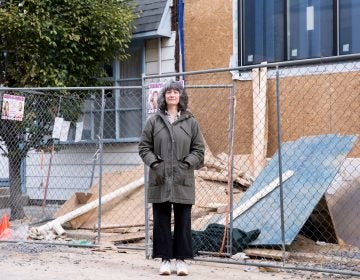Casino gets community benefits agreement
Photo courtesy Brad Maule/phillyskyline
Nov. 20
By Kellie Patrick Gates
For PlanPhilly
SugarHouse Casino has reached a benefits agreement with two neighborhood groups outlining the money and other contributions it will provide communities near its Delaware Avenue site starting shortly after developers receive the permits and approvals to start construction.
The casino has agreed to give $175,000 within 14 days after receiving the permits and approvals, then at least $1 million annually after opening and as much as $1.5 million after the casino has been operating for three years. The Community Benefits Agreement was reached after more than a year of negotiations with pro-casino group Fishtown Action, also known as FACT, and the New Kensington Community Development Corporation.
“Fishtown Action is proud of the Community Benefits Agreement that we have signed with SugarHouse Casino” said Maggie O’Brien, President and Co-Founder of Fishtown Action, in a press statement issued by SugarHouse. “We believe that this agreement addresses many of the community’s concerns while providing our neighbors and local businesses with significant opportunities to benefit from this project.”
But other neighborhood groups – Fishtown Neighbors Association and Northern Liberties Neighbors Association were never part of the talks. They were invited, but, along with a co-alition of many other neighborhood groups called the Philadelphia Neighborhood Alliance, they refused to negotiate with casino developers unless the talks included building the casino on a different site. Another organization, the Old Richmond Civic Association, attended the talks at first, but then walked away from them.
Those who refused to negotiate say the agreement does not provide the kind of protection their neighborhoods need. Matt Ruben, president of the Northern Liberties Neighbors Association, said if SugarHouse builds at its waterfront site, NLNA would seek other protections for the neighborhoods through the state legislature.
“Private parties are perfectly free to negotiate private agreements, which is what they’ve done,” Ruben said. “This agreement doesn’t speak to the needs and interests of the residents of Northern Liberties.”
Those who negotiated the agreement say it’s not their fault that some groups chose not to participate. “They were invited to each and every meeting, to sit down and negotiate with us, and they elected not to come,” said Richard F. Levins, president and board chairman of the New Kensington Community Development Corporation. “We could not force them to come to the table.”
True, Ruben said. “But FACT doesn’t get to decide by itself what the consequences of that choice are. They did what they did, and they have every right to do it. Following the will of our communities, we decided to go a different way. But the people who live in any communities directly impacted by any casino need to be protected.”
Levins said that those who did the talking with SugarHouse successfully negotiated for items that address many of the concerns brought up by those who stayed away from the sessions. For example, he said, SugarHouse has agreed to provide free parking for patrons and employees so that they are not tempted to park in residential areas as well as prohibit buses from idling on Delaware Avenue or side streets.
The casino concern has also agreed to create an internship program for neighborhood college students and a job-training program for non-college students. It will also create a program through which gamblers can redeem points for discounts at local businesses.
SugarHouse spokeswoman Leigh Whitaker said the casino agreed to negotiate a Community Benefits Agreement during the time it was in talks with the city related to its 10-year tax abatement.
“We are very pleased we have been able to reach an agreement with these groups that will maximize the benefits of our development to the immediate community,” said Greg Carlin, SugarHouse’s chief executive officer, in the press release.
Special Service District lessons
The agreement calls for a Special Services District to be created as a tax-exempt organization. This organization would receive SugarHouse’s annual financial contribution and determine what should be done with it. “SugarHouse Casino will not have a role in the SSD’s governing board or its expenditures,” SugarHouse’s press release said.
State Rep. Mike O’Brien, who has worked to get SugarHouse to move from its waterfront location, said that while the agreement calls for a Special Services District, what it really describes is “a private agreement between a developer and a community group which has no weight of law behind it.”
A true SSD would require action by both the State Legislature and City Council, O’Brien said. A true SSD can place a lien against a business that does not make its required contributions, O’Brien said, but if SugarHouse decided not to make its annual payments, the organization created under the CBA would have to take the casino to court.
“They have been misusing the phrase Special Services District,” O’Brien said. “This is a single purpose non-profit.”
O’Brien said he would not be willing to introduce legislation to create a SSD that operated under the conditions laid out within the SugarHouse CBA because key community organizations were not part of the talks. He said city representatives took part when John Street was mayor, but they have not been present during Mayor Michael Nutter’s administration. No state officials have taken part, either.
“With the bleak city budget, any money put into a community to improve the quality of life is a good thing,” O’Brien said of the CBA. “But it doesn’t deal with the larger issues that need to be dealt with – for example, increased police protection, which has been estimated to cost $6 million.”
O’Brien has introduced legislation in the past that would enable municipalities with casinos to create SSDs. It was defeated. He plans to try again in January, in hopes that City Council would create an SSD around SugarHouse and Philadelphia’s other proposed casino, Foxwoods.
Brian Abernathy, spokesman for City Councilman Frank DiCicco, in whose district SugarHouse would reside if it is built on the waterfront, said that while SSDs can be created by ordinance, they don’t have to be. The Stadium Districts in South Philadelphia were not, he said.
Abernathy said he could not comment on the SugarHouse CBA, as he hadn’t seen it. Douglas Oliver, spokesman for Mayor Michael Nutter, said the city had just learned about the agreement late Thursday, so he could not comment, either.
Levins said FACT and the New Kensington Community Development Corporation will meet with an attorney who will help them navigate the creation of the SSD called for in the SugarHouse Community Benefits Agreement. Any of the community organizations that did not participate in the CBA negotiations can sign onto it now, he said. The agreement wouldn’t be re-opened, but “they could provide input into special services district documents have to create,” Levins said.
Ruben said if SugarHouse builds on the waterfront, he would seek a Special Services District created through legislation. And he would want the state and city legislators to take another look at the amount of money SugarHouse gives the community, the size and location of the district, and the structure of the governing board that determines what happens to the money.
Levins said the SSD created as a result of the neighborhood agreement would include all of Northern Liberties and Fishtown and portions of the Old Richmond and Old Richmond Civic areas. Its first governing board would be appointed by members of FACT and NKCDC, but appointees would include residents from around the entire district, he said. Within months, an election would be held and any resident of the SSD can seek a spot on the board.
Levins pointed out that the appointees would not be deciding the fate of very much money, since the elected board would be seated before the casino would open and provide $1 million per year.
Governing board members will not be paid, he said. “Every penny is going to go back into the neighborhood. And there will be complete transparency – everybody in the community will know where every penny goes.”
Ruben said he has no regrets about not negotiating.
“You can’t have regrets if you’ve represented the will of your community, and you can’t have any regrets if you don’t think that this issue is in the past tense.”
Contact the reporter at kelliespatrick@gmail.com
WHYY is your source for fact-based, in-depth journalism and information. As a nonprofit organization, we rely on financial support from readers like you. Please give today.






